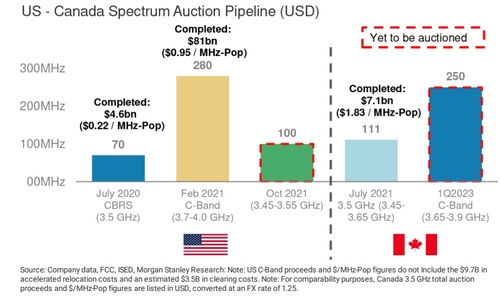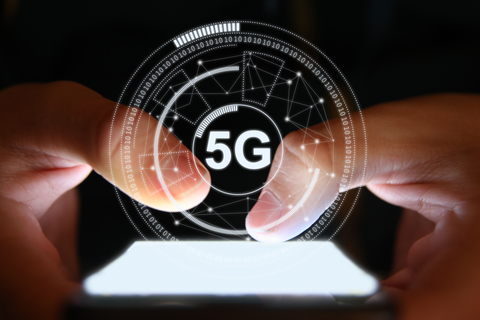midband spectrum
Big U.S. Wireless Carriers to bid at FCC mid-band auction; cablecos missing in action
The FCC will conduct another 5G spectrum auction on October 5th. FCC Auction 110 will be for 100MHz in the 3.45GHz to 3.55GHz band for flexible use of wireless services.
Full Title: Auction of Flexible-Use Service Licenses in the 3.45-3.55 GHz Band for Next-Generation Wireless Services; Status of Short-Form Applications to Participate in Auction 110
Auction 110 will offer approximately 4,060 new flexible‐use licenses of 100Mhz within the 3.45–3.55 GHz band (3.45 GHz Service) throughout the contiguous United States. Bidding in Auction 110 is scheduled to begin on October 5, 2021.
…………………………………………………………………………………………….
Analysis:
AT&T, T-Mobile, US Cellular and Dish Network are among the 42 different entities that registered interested in participating in Auction 110, based on the roster contained in FCC filings related to the auction (attachments A & B in References below). Verizon’s application is listed as incomplete.
We’ve never heard of most of the other companies bidding, but note that the big cablecos/MSOs (Comcast, Charter Communications, Altice USA and Cox Communications) are not listed.
3.45 GHz spectrum up for auction is in the mid-band range seen as key for 5G by offering a mix of coverage and capacity, and sits nearby the 3.7 GHz C-band and the shared 3.5 GHz Citizen Broadband Radio Service (CBRS) band.
Financial analysts at New Street Research say that Auction 110 will increase the total overall amount of spectrum in circulation in the US from 1023MHz to 1123MHz. They believe that AT&T and T-Mobile to be the big winners with Dish Network an also ran.
“We think that AT&T, T-Mobile and Dish each want 40MHz in the 3.45GHz auction (the limit any one company can buy), but there is only 100MHz to go around,” the analysts wrote in a note to investors in July. “Based on visible resources, AT&T and T-Mobile are best positioned to end up with 40MHz each, leaving 20MHz for Dish (and other participants).”
Analysts at Morgan Stanley offered a their perspective at how the upcoming 3.45GHz-3.55GHz FCC auction compares with recently completed spectrum auctions in the U.S. and Canada.

Source: Morgan Stanley
“AT&T will be keen to get the maximum 40MHz allowable on a quasi-nationwide basis, while T-Mobile has said they will be opportunistic, although they and Verizon already have some 200MHz of midband spectrum. Dish is another wild card, although it lacks the financial resources of the larger wireless players,” wrote the financial analysts at Morgan Stanley in a note to investors this week.
…………………………………………………………………………………………….
Recent FCC auctions have included the 37GHz, 39GHz and 47GHz spectrum bands in Auction 103, Auction 101 of 28GHz spectrum and Auction 102 of 28GHz spectrum, Auction 105 for 3.5GHz CBRS spectrum licenses, and Auction 107 -the C-band auction (which ended earlier this year and generated an astounding $81 billion in winning bids).
“We think Auction 110 looks much more similar to the smaller, cheaper CBRS auction that had $4.5 billion in net bids for 70MHz of spectrum ($0.215 per MHz POP), than the larger, more expensive C-band auction that ended with $81 billion in net bids for 280MHz of spectrum ($0.945 per MHz POP),” wrote the financial analysts with Raymond James in a note to investors this week. (The per MHz-POP calculation is applied to most spectrum transactions and reflects the number of people covered compared with the amount of spectrum available, though it can be affected by a wide variety of factors.) The Raymond James analysts cited Andromeda’s 40MHz ownership cap and military sharing zones as reasons for their conclusions.
“Still, midband spectrum remains crucial in densifying 5G networks, and while we do not expect anywhere close to C-band-like prices, this is a good opportunity for price-conscious bidders (e.g. Dish) to augment spectrum holdings,” the Raymond James analyst team concluded.
………………………………………………………………………………..
Terms & Conditions for Auction 110:
Upfront payments for Auction 110 are due in the proper account at the U.S. Treasury by 6:00 p.m. Eastern Time (ET) on Thursday, September 2, 2021. In order to meet the Commission’s upfront payment deadline, an applicant’s payment must be credited to the Commission’s account by the deadline.
Due Diligence: The FCC reminds each potential bidder that it is solely responsible for investigating and evaluating all legal, technical, and marketplace factors and risks associated with the licenses that it is seeking in Auction 110; evaluating the degree to which those factors and risks may have a bearing on the value of the licenses being offered and/or affect the bidder’s ability to bid on, otherwise acquire, or make use of such licenses; and conducting any technical analyses necessary to assure itself that, if it wins any license(s), it will be able to build and operate facilities in accordance with the Commission’s rules.
Non Disclosure Rules: Bidding applicants must take care not to communicate non-public information to the public, financial analysts, or the press.45 Examples of communications raising concern, given the limited information procedures in effect for Auction 110, would include an applicant’s statement to the press or other public statement (for example, a statement on social media) about its upfront payment or bidding eligibility, an applicant’s statement to the press or other public statement that it is or is not interested in bidding in the auction, or an applicant’s statement to the press or other public statement prior to the down payment deadline that it is the winning bidder in any particular geographic areas.
References:
https://www.fcc.gov/auction/110
https://www.fcc.gov/document/auction-110-345-ghz-service-application-status
https://www.fcc.gov/document/auction-110-345-ghz-service-application-status/attachment-a
https://www.fcc.gov/document/auction-110-345-ghz-service-application-status/attachment-b
https://www.fcc.gov/document/facilitating-5g-345-355-ghz-band
https://www.lightreading.com/5g/what-to-expect-from-upcoming-345ghz-auction-for-5g/d/d-id/771612?
https://www.lightreading.com/5g/cable-may-miss-americas-next-big-5g-spectrum-auction/d/d-id/771578?
https://www.benton.org/headlines/big-wireless-carriers-apply-fccs-mid-band-spectrum-auction
T-Mobile shutters Sprint’s 5G network; OpenSignal 5G User Experience report highlights
As expected following the April 1st close of T-Mobile’s acquisition, Sprint’s 5G network (which uses 2.5GHz mid-band spectrum) has been deactivated while the “new T-Mobile” works to re-deploy it across its own network.
The integration of the Sprint mid-band spectrum is a key part of T-Mobile’s 5G strategy, which aims to combine low-band 600MHz spectrum for broad, nationwide 5G coverage with faster but lower-range midband (Sprint’s 2.5GHz network) and short-range mmWave networks for a balance of coverage and speed.
T-Mobile has already deployed its new 2.5GHz spectrum in New York, the first market to benefit from the wireless network operator’s spectrum in low-, mid-, and millimeter wave bands. The operator’s 2.5GHz 5G is also live in “parts” of Chicago, Houston, Los Angeles, New York, and Philadelphia.
Most existing Sprint customers won’t be able to use their current devices going forward to access 5G. Newer devices that feature Qualcomm’s X55 modem, like the Galaxy S20 5G lineup, will still be able to access the 2.5GHz 5G when they relaunch as part of the new T-Mobile’s 5G network (along with the rest of T-Mobile’s low-band and mmWave 5G spectrum). T-Mobile is offering credits for affected customers to lease a new 5G device.
“We are working to quickly re-deploy, optimize and test the 2.5 GHz spectrum before lighting it up on the T-Mobile network. In the meantime, legacy Sprint customers with compatible devices can enjoy T-Mobile’s nationwide 5G network,” a T-Mobile spokesperson said.
According to data from a new Opensignal 5G User Experience report, customers using T-Mobile’s mid-band 5G are benefitting from average download speeds of around 330Mbps. The mobile analytics company ranks T-Mobile first for 5G availability; with customers receiving a 5G signal around twice as often as AT&T and 56 times more than Verizon.
T-Mobile’s press release about the Opensignal report said customers are seeing average download speeds of 330 Mbps on its mid-band 2.5 GHz network.

From that OpenSignal report:
T-Mobile wins the 5G Availability award, as its 5G users spend 22.5% of time connected to 5G:
The time connected to a 5G service is extremely important if users are to enjoy all of 5G’s benefits. In the U.S., T-Mobile won the 5G Availability award by a large margin with Sprint and AT&T trailing with scores of 14.1% and 10.3%, respectively. Verizon users saw their extremely fast 5G service 0.4% of the time because of the limited geographical reach of the mmWave wireless technology Verizon currently relies upon for 5G and the early stage of the 5G deployment.
Sprint’s 5G users’ experience is already changing as new T-Mobile combines its network capabilities:
When we previously looked at the 5G Download Speed of Sprint’s users some time ago we saw average 5G speeds of 114.2 Mbps reflecting the mid-band 5G wireless spectrum Sprint relied upon. But following the completion of T-Mobile’s acquisition of Sprint, the new T-Mobile is starting to provide Sprint 5G users with access to old T-Mobile’s 600MHz spectrum and so average 5G speeds are now 49.5 Mbps but 5G Availability has risen from 10.3% to 14.1% of time. T-Mobile is still in the process of merging its original network with Sprint and we expect the mobile network experience of Sprint users will continue to change for some time.
………………………………………………………………………………………………………………………………………………………………………….
“Building the fastest 5G network is easy if you only cover less than 50 square miles. Opensignal’s report shows that only T-Mobile is doing the hard work to deliver BOTH 5G coverage and speed. And we’re just getting started,” said Neville Ray, President of Technology at T-Mobile.
“With the addition of Sprint, the Un-carrier’s 5G is getting bigger, better and faster every day, moving quickly on our mission to build the world’s best 5G network, one unlike any other, to people all across the country!”
T-Mobile and Sprint were finally cleared to merge on April 1st, following discussions which began in 2013.
To appease regulators, T-Mobile agreed to sell Sprint’s prepaid business, Boost Mobile, and Virgin Mobile to Dish network for $1.4 billion. The deal also included selling Sprint’s entire 800 MHz portfolio of spectrum to Dish. Those deals formally completed yesterday.
Last month, T-Mobile asked California’s Public Utilities Commission (CPUC) to ease other conditions it agreed to in order for the merger to be granted – including job creation promises following the COVID-19 pandemic, average 5G coverage and speed commitments, and to remove a “burdensome” third independent test of its network.
……………………………………………………………………………………………………………………………………………………………………
References:
T-Mobile switches off Sprint’s 5G network following $26.5 billion merger
https://www.opensignal.com/reports/2020/06/usa/mobile-network-experience-5g


